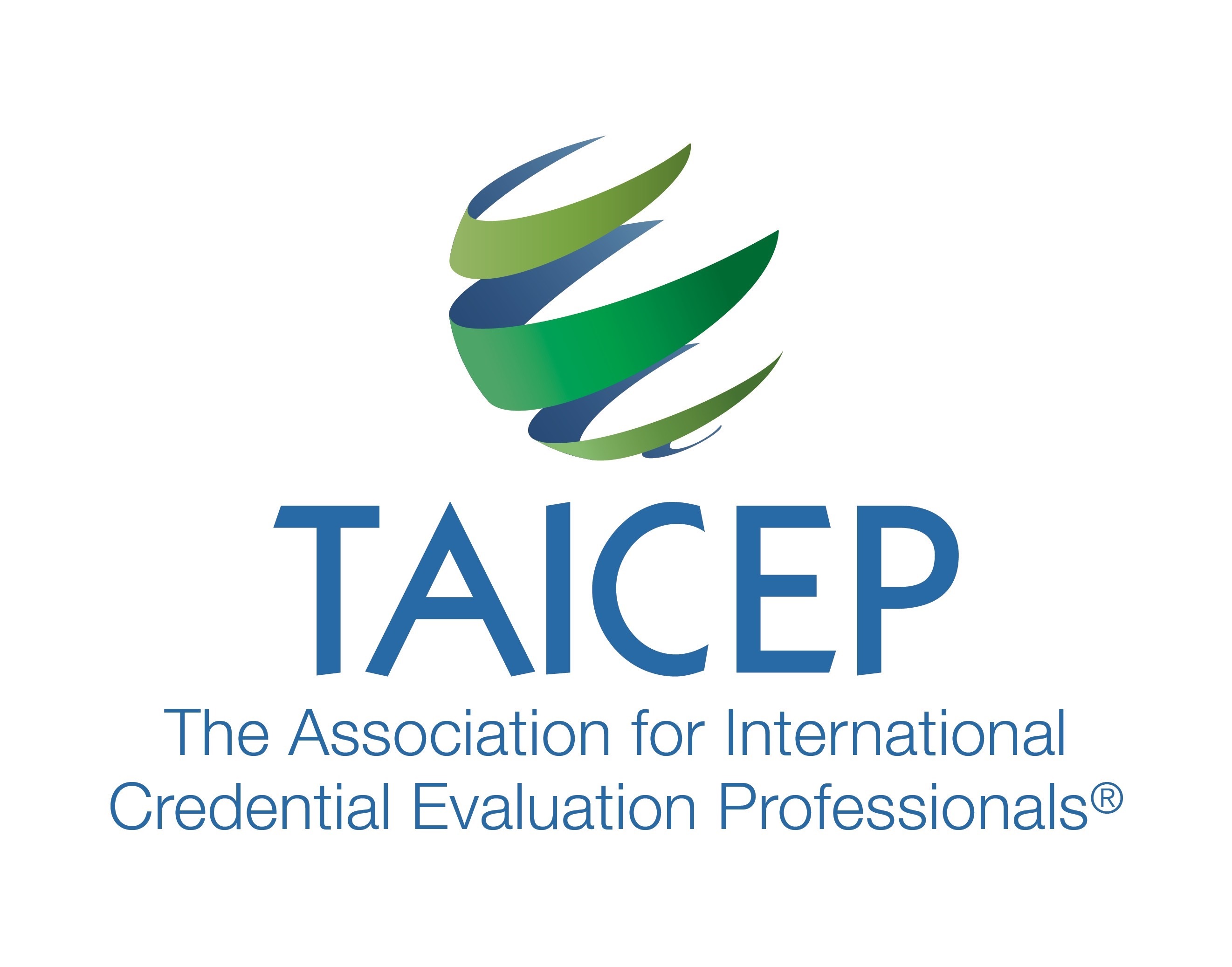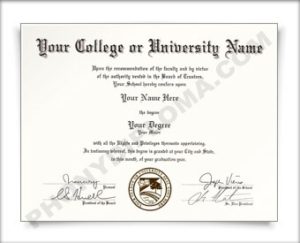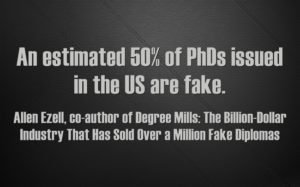Written by: Shereen Mir-Jabbar, Canadian Alliance of Physiotherapy Regulators
Almost every credential evaluator has or will come across a document that is either fraudulent or was issued by a degree mill institution. Advances in technology are making it easier for fraudulent documents to be produced, and slick online marketing is making it easier for fake institutions to issue “credentials” that require little to no coursework.
Fraud
According to the terminology guide produced by the Canadian Information Centre for International Credentials (CICIC), a fraudulent credential is defined as “a document that has been modified or reproduced without authorization of the original issuing body. A fraudulent document is also considered forged if it is claimed that it was issued by a legal entity that did not issue it.” Various types of fraud include: alteration of documents, such as grades on a transcript, or substitution of a name on a degree where the degree belongs to a different person; completely fabricated or counterfeit documents; institutional fraud, which could involve bribing officials in legitimate institutions to produce authentic-looking documents; and misleading or interpretive translations, such as taking a translator’s word that a Latin American Bachiller credential is a university-level Bachelor’s degree. It is important to keep in mind that instances of fraud like the ones noted above are different from degree or diploma mill credentials, which will be further discussed below.
There are several warning signs that can help you detect if a document could be fraudulent. Things to look out for include: too many fonts appearing on the document, several spelling errors, unusual signatures or stamps, age or biographical discrepancies, and evidence of white out/erasure. Unfortunately, advanced technology that is readily available online has made it increasingly easy for people to either obtain or produce fraudulent documents. Tools and tricks such as authentic-looking degree templates, fake stamps, editing software, and website spoofs can often go unnoticed by even experienced credential evaluators. Some of the best ways to combat fraud are to be familiar with various educational systems and have access to reliable resources to locate this information; implement strong documentation requirements at your institution, such as requiring official documents to be sent directly from the issuing institution, or by using original documents; and making use of online verification tools where possible.
Degree Mills
Credentials issued by degree mills are another set of problematic documents that are becoming increasingly prevalent. Allen Ezell, former FBI agent and degree mill expert, estimates that 50% of PhDs issued in the U.S. are fake. Allen Ezell and John Bear co-authored the book Degree Mills: The Billion-Dollar Industry That Has Sold Over a Million Fake Diplomas, and define the following characteristics of degree mills in their book:
- “Degree-granting authority does not come from a generally accepted government agency;
- Procedures for granting credit for prior learning and for determining the amount and quality of work done to earn the degree, do not meet generally accepted standards, and;
- Those who make the decisions on credit, and on quantity and quality of work, do not have the credentials, experience or training typically associated with people performing these tasks.”
In other words, degree mills are institutions that operate without proper accreditation and offer credentials that require little to no work to obtain, and are run by individuals who do not have the appropriate qualifications or experience to evaluate credit and coursework.
There are several red flags that will help you determine if an institution is a degree mill. These include: similar or almost identical names to legitimate institutions (i.e. the accredited and recognized University of Wolverhampton vs. degree mill University of Wolverhamton, without the “p”), offering credits or an entire degree based solely on life experience, little information about the physical location of the institution, and a strong emphasis on discounts or payment of the credential (i.e. for only $3000, the institution will throw in a PhD degree along with the Master’s degree). It is crucial to check the institution’s recognition or accreditation status and to be aware that, in addition to degree mills, accreditation mills exist as well, with the sole purpose of appearing to legitimize degree mill institutions and the “credentials” that they issue. Other ways to prevent degree mill credentials from being accepted into your institution include: keeping a checklist that identifies warning signs, maintaining or reviewing lists of known degree mills and fake institutions, reviewing online credentialling community forums (such as degreeinfo.com), and asking questions and sharing your knowledge of degree mills with others in the credential assessment community.
The aftermath of Axact: A Summary of the Investigation on the Degree Mill Operation and Current Updates
Axact, located in Karachi, Pakistan, identifies itself as a leading IT company but is one of the world’s largest degree mill operations. An article published by the New York Times in May 2015 revealed that Axact earned millions of dollars in sales of fake credentials from over 300 online “institutions”. Over the past decade, Axact has taken money from approximately 217,000 people from 197 countries, with about a third of their customers located in the United States of America. At least $140 million were collected by Axact with US-based bank accounts from thousands of individuals from about 2006 to around May 2015. After the New York Times article, the Axact offices in Pakistan were shut down and hundreds of documents were confiscated. Axact’s CEO, Shoaib Ahmad Shaikh was charged during this time, along other executives, but all were later acquitted by Pakistan officials in late 2016. Even after the company shut down in May 2015, Axact Vice-President, Umair Hamid, continued to sell degree mill credentials, particularly to American customers. Hamid was arrested by the FBI in December 2016 for his role in the Axact operation, and on April 6, 2017, pleaded guilty to conspiracy to commit wire fraud; in August 2017, he was sentenced to 21 months in prison and ordered to forfeit over $5 million. In Pakistan, one of the sitting judges who acquitted Axact CEO Shaikh and other officials in 2016 allegedly admitted to receiving a bribe of over 5 million rupees; this judge may be undergoing disciplinary proceedings, but there are no further details regarding the proceedings or further investigation into this matter.
The Canadian Broadcasting Corporation’s show “Marketplace” recently investigated phony credentials related to Axact, and have found that over 800 Canadians could have purchased a fake degree from an Axact-based institution. The journalists even successfully purchased PhDs, transcripts, and attendance records from Almeda University and Gatesville University, both linked to Axact, proving just how easy it was to obtain fake degrees and transcripts. The CBC Marketplace investigation also revealed several individuals who possess fake credentials from institutions tied to Axact including a counsellor named Gilbert Correces with a fake PhD in Biblical counselling from Almeda University, a professor named Dubravko Zgrablic who has taught at four post-secondary institutions in Ontario who claimed to have a Master’s degree in Computer Science from Almeda University, a business consultant named Erwin Sniedzin who paid $8100 with no course work or exams to obtain a Master’s degree in Education from Kings Lake University, and a person named Inayat Kassam acting as a lawyer with a fake law degree from the University of Renfrew and a Bachelor of Arts degree from Axact-linked institution Ashwood University.
Most of these individuals have claimed that they weren’t aware that their credentials were fake, or removed these credentials from their social media profiles after the Marketplace investigation. It is often difficult to prove intent of such individuals, but many experts do claim that most people are aware of what they’re purchasing and what it will help them achieve. Despite the international headlines Axact has made from 2015 until now, one Pakistani publication commented that the case appears to have been forgotten in Pakistan itself. This likely means that Axact, and other degree mill institutions, will continue to operate unchecked.
The Impact of Fraud and Degree Mills in our Society
Unfortunately, fraudulent documents and degree mill operations are a problem that do not seem likely to disappear anytime soon. There have been several doctors, educators, lawyers, professionals, and even ministers of government who have been caught using fake credentials to obtain their positions, or to work with clients or practice on patients. Fraudulent documents pose a substantial risk of harm to society. If we are entrusting a doctor to save a life, and he or she has a fake credential, it could cause serious harm or even death to one individual or more. If you have a legitimate Master’s degree in Education and are passed over for a promotion in favour of someone who obtained a fake Master’s or PhD credential, your hard-earned education is not being rewarded or recognized. The acceptability of forged or fake credentials also signals an unethical message to society – that you can cheat and fake your way to get what you want.
Those who have not rightfully earned their credentials should not be rewarded. It is up to credential evaluators, employers, and governments to do their part to prevent fraudulent documents from entering their systems. If we can work together to implement procedures to catch fraudulent credentials and policies that show serious consequences for committing fraud, perhaps over time we can reduce fraud, or even prevent it from occurring in the first place.
References and Further Reading
Canadian Information Centre for International Credentials (n.d). Introduction to the English Terminology Guide for Academic Credential Assessment in Canada. Retrieved from: http://terminologies.cicic.ca/app/
CBC Marketplace Blog (2017, September 14). List of schools linked to Axact. Retrieved from: http://www.cbc.ca/marketplace/blog/list-of-schools-linked-to-axact
Cheema, U. (2017, September 16). Axact scandal in headlines abroad, forgotten in Pakistan. The International News. Retrieved from: https://www.thenews.com.pk/print/230320-Axact-scandal-in-headlines-abroad-forgotten-in-Pakistan
Dawn News (2017, August 29). Axact VP sentenced to 21 months in prison by US court in diploma mill scam. Retrieved from: https://www.dawn.com/news/1354691
Dunn, T. (2017, Sept 15). Toronto man ‘angry’ after learning his $8,100 master’s degree that required no exams or academic work is fake. CBC. Retrieved from: http://www.cbc.ca/news/canada/toronto/fake-degree-toronto-investigation-1.4287347
Ezell, A. & Bear, J. (2012). Degree mills: The billion-dollar industry that has sold over a million fake diplomas. Amherst, New York: Prometheus Books.
Johnson, E. (2017, September 11). I am devastated’: Toronto lawyer out $100K after hiring fraudster with fake law degree. CBC. Retrieved from: http://www.cbc.ca/news/business/fake-toronto-lawyer-defrauds-clients-1.4276157
Reuters Staff (2016, December 21). U.S. charges Pakistani executive in $140 million fake diploma scheme. Retrieved from: http://www.reuters.com/article/us-usa-diplomas-pakistan/u-s-charges-pakistani-executive-in-140-million-fake-diploma-scheme-idUSKBN14B023
Shehzad, R. (2017, June 16). Axact fake degree case: Judge confesses to receiving Rs5m bribe to acquit Shoaib Shaikh. The Express Tribune. Retrieved from: https://tribune.com.pk/story/1436815/axact-fake-degree-case-judge-confesses-receiving-rs5m-bribe-acquit-shoaib-shaikh/
Szeto, E. & Vellani. N. (2017, Sept 14). ‘All of us can be harmed’: Investigation reveals hundreds of Canadians have phoney degrees. CBC Marketplace. Retrieved from: http://www.cbc.ca/news/business/diploma-mills-marketplace-fake-degrees-1.4279513
Szeto, E. & Vellani. N. (2017, Sept 16). 1,000% unacceptable’: Marketplace confronts college professor about his fake degree. CBC Marketplace. Retrieved from: http://www.cbc.ca/news/business/marketplace-diploma-mills-degrees-professor-1.4291437
Walsh, D. (2015, May 17). Fake diplomas, real cash: Pakistani company Axact reaps millions. New York Times. Retrieved from: https://www.nytimes.com/2015/05/18/world/asia/fake-diplomas-real-cash-pakistani-company-axact-reaps-millions-columbiana-barkley.html
Inside this edition:
President’s Welcome: November 2017 Newsletter
Committee Updates: November 2017 Newsletter
Education and Licensure of Health Care Professionals in the USA: November 2017 Newsletter
International Secondary Schools: Whose Education System Is it, Anyway? November 2017 Newsletter
Memoriam to Sandy Gault: November 2017 Newsletter
TAICEP Elections: November 2017 Newsletter
TAICEP Strategic Plan: November 2017 Newsletter
TAICEP News: November 2017 Newsletter
Add to Your Library: November 2017 Newsletter
Recent TAICEP Events: November 2017 Newsletter
Upcoming TAICEP Events: November 2017 Newsletter


